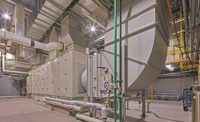Best Projects
Best Energy/Industrial: North Carolina State University Centennial Campus TES

Photo courtesy Greenland Enterprises Inc.
NC State Centennial Campus — Thermal Energy Storage System
Raleigh
BEST PROJECT
CONTRACTOR: Greenland Enterprises Inc.
OWNER: North Carolina State University
LEAD, STRUCTURAL, CIVIL ENGINEER: RMF Engineering
To reduce the university’s energy costs while avoiding the capital expenditures needed to expand the existing energy plant’s cooling capacity, the design and construction team delivered a 3.5-million-gallon chilled water, thermal energy storage tank in May 2020. Under its current rate structure, the university pays local utilities more during peak times. The TES allows 25,000 ton-hours of compressor load to be generated during off-peak times, then discharged during on-peak hours.
While the design called for installing 166 H-piles to a depth of 45 ft, subsurface soil conditions required that many piles be driven to a depth of between 65 and 70 ft. Each extension required a field-engineered solution to be approved by the engineer of record. The extensions required partial removal of the existing pile, welding on additional length of steel and reinstallation.

Photo courtesy Greenland Enterprises Inc.
Concrete work, including a 3-ft-thick reinforced pile cap and tank base, was completed with zero deficiencies or rework. The tank base was poured in one continuous 600-cu-yd pour, involving 60 concrete truck deliveries that had to navigate around the occupied campus.
Sited on limited space among existing buildings, the team designed individual tank panels that were prefabricated off site. Without sufficient laydown area, a steady stream of just-in-time panel deliveries, crane picks and site welding had to be scheduled to support the assembly process.

Photo courtesy Greenland Enterprises Inc.
Commissioning required complex coordination between the central plant—which runs nonstop—and the new construction. To integrate the TES system into the existing cooling plant, the team had to balance the chiller plant cooling and TES cooling generation with the campus cooling demand and the recharging of the TES tank.
The completed project quickly realized significant energy cost savings to the university, with data from the first six months of operation suggesting it could see annual savings of at least $300,000.




